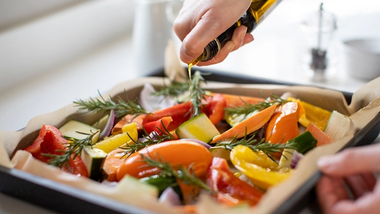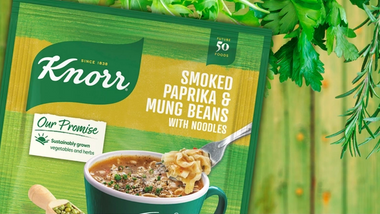
Royco in Indonesia
In Indonesia, Royco bouillon powder is made with iodised salt. Iodine is essential for brain development and children’s growth, and it’s especially important for young children and pregnant women.
Unilever Global Change location

Average read time: 12 minutes
We use positive ingredients and nutrients, including fortification, to make nutritious and delicious products.

The nutritious ingredients in many of our products provide the micronutrients, protein or fibre that people need as part of a balanced diet. We include seasonal fruits and vegetables, as well as beans and pulses, wholegrains and healthy oils. Vegetables like tomatoes, pumpkins, lentils and onions are hero ingredients in many Knorr products. And each year, we provide more than 100 billion servings of vegetables through these options.
By the end of 2022, our products had provided 236 billion servings (exceeding our target of 200 billion) with at least one of the five critical micronutrients – vitamin A, vitamin D, iodine, iron and zinc. Nutritious diets, healthy habits for everyone explains how our campaigns, as well as our products, are helping people to eat nutritiously. But we want to go even further, as we believe everyone deserves good food.
We’re raising nutritional standards across our Nutrition and Ice Cream portfolios through our Future Foods commitments, which are part of our Unilever Compass goals for positive nutrition.
To meet our goal of doubling, we need to reach 54% by 2025. At the end of 2022, 48% of our portfolio was in line with our Positive Nutrition Standards.
Knorr’s goal is to get food that is good for people and the planet onto 7 billion plates by 2025.
Three easy steps to eating for good
We want to inspire everyone to make simple ingredient swaps, shaking up meals to increase their nutritional value and reduce their environmental impact.
Nutritious diets, healthy habits for everyone explains more about our Future 50 Foods campaign. We’re busy creating new products that feature the Future 50 Foods, such as our new South African Knorr Cup-a-Snack with mung beans and lentils, mixed with a variety of vegetables for a delicious flavour.

We’re also busy creating new products to enhance the vegetable content on people’s plates, like our new Knorr dehydrated vegetables range in Argentina. The 100% spinach, onion, bell pepper or carrots take only three minutes to hydrate and can be added to a variety of recipes to make nutritious cooking easier.
By picking vegetables and grains at their peak and drying them gently, we’re able to lock in their nutrient goodness.
Our Knorr dried vegetable soups, for instance, deliver up to 290 g of vegetables per serving – more than half of the daily amount of fruit and vegetables recommended by the World Health Organization. Our Knorr meal kits also encourage consumers to eat more vegetables and try new ingredients, including flexitarian and vegetarian alternatives.
In the Netherlands, we’ve introduced a new tomato flavour to our Knorr Wraps range – these are made with at least 35% vegetables. In Belgium and the Netherlands, we’ve launched our new line of Knorr Veggie Pastas containing 30% vegetables. And in some European markets, people can now cook with Knorr Seasonings and Knorr Fix Mealmakers. These have been designed to turn traditional dishes – like chilli con carne in Sweden and Denmark or the gulasz in Poland – into plant-based alternatives.
But it’s not just Knorr that’s helping people to access nutritious ingredients.

All over the world, we’re introducing new products with a focus on nutrition as well as flavour. In Latin America, for example, we’re increasing the number of wholegrain products available, like snacks and breakfast cereals, by expanding our portfolio of Mãe Terra and Maizena. In 2023 in India, we launched Millet Chocolate Horlicks, made with the goodness of wholegrain multi millets, which are a natural source of calcium, iron, protein and fibre – all critical for children’s growth. And in Germany, our Knorr Wholegrain Pasta Snack pots won the 2022 Product of the Year in the dry and frozen ready meals category.
We continue to increase the amount of vegetables in our products. In France, we introduced a range of vegetable soups containing 100% natural ingredients. In Turkey, we launched Knorr Buckwheat Yoghurt soup – a source of protein and iodine. And in Turkey and across Europe, our new Knorr Disney soups for kids are a source of protein, fibre and iodine. In Mexico, too, we introduced three new soups, including our wholesome Knorr Black Bean soup, providing vegetables and wholegrain pasta.
2 billion People are affected by micronutrient deficiency
Despite efforts to eat well and combat malnutrition around the globe, around a quarter of the world's population is still affected by micronutrient deficiency. From anaemia to pregnancy-related issues, health is damaged simply by the lack of a few micronutrients, such as iron and iodine.
The WHO and leading economists have identified food fortification as one of the most cost-effective approaches to meeting people's nutritional needs and this does not require the consumer to change their diet. Fortification is when small and safe amounts of essential micronutrients are added to foods that are eaten regularly.
Our scientists modelled the potential impact of fortifying products like soy and fish sauces, bouillons and seasonings with iodine and iron in Asian countries. The study showed that fortifying affordable and frequently consumed products in our Nutrition portfolio can help to bring iron and iodine intakes closer towards the recommended intake levels.
We’ve prioritised both fortification and positive nutrition to help people get the nutrients they need.
Every single day, we sell millions of servings of fortified products, including seasonings, bouillons, soups, sauces and ice creams.
These servings include at least 15% of the recommended daily amount for nutrients, in line with regulations. We offer fortified foods at an affordable price, develop products using good ingredients like vegetables, fruits, dairy and vegetable oils to support more diverse diets, and promote nutritious cooking – to support this, we’ve set out our latest position statement on fortification (PDF 126.38 KB).
By the end of 2022, we aimed to provide more than 200 billion servings with at least one of the five key micronutrients, vitamin A, vitamin D, iodine, iron and zinc. We’re proud that we achieved this commitment, delivering 236 billion servings.
Some of our top sellers around the globe, such as our bouillons which are sold in 59 countries under the Knorr, Royco, Continental, Knorrox brands through retail and Unilever Food Solutions, offer a variety of the five critical micronutrients.

In Indonesia, Royco bouillon powder is made with iodised salt. Iodine is essential for brain development and children’s growth, and it’s especially important for young children and pregnant women.

In Nigeria, our Knorr chicken and beef cubes are fortified with iron and iodine, helping women and teenage girls to fight anaemia.

In Ethiopia, Knorr’s all-in-one bouillon cube is fortified with iodine and zinc. Zinc is essential for a functioning immune system, while zinc deficiency can lead to impaired growth and increased susceptibility to infectious diseases.

In Egypt, our Knorr chicken, beef and vegetable stock cubes are fortified with iodine, helping to address iodine deficiencies in the country.

In India, Horlicks drinks are all fortified with critical micronutrients – such as iron, zinc and vitamin D – and have been clinically proven to help make kids taller, stronger and sharper.

In Brazil, our Cremogema and Arrozina porridge ranges nourish kids with iron, zinc and vitamin A, helping them to grow up strong.

In South Africa, we make our Knorrox affordable soy mince (meat replacer) range a source of zinc. And Knorrox’s stock powder and cube ranges are fortified with iron to help fight anaemia.

In India, we relaunched Kissan Mixed Fruit Jam, which is now fortified with vitamin A and zinc to help maintain immune health and unlock energy.
Our Global Diet & Health team developed our internal plant-based meat standards, in line with global recommendations. The standards include ensuring a minimum of 15% Nutrient Reference Values (NRV) per serving for micronutrients like iron and vitamin B12. This means when people eat any of our meat alternatives, like The Vegetarian Butcher’s Little Peckers, Patty on the Back, or Chickened Out Burger, they can be guaranteed of our high nutrition standards.
More Fortified ProductsFrom fortified porridges to bouillons and meat replacements, our products are helping millions of consumers to boost their nutrition. These are just a few of our new product launches from 2022:
We’ve been recognised for our work addressing undernutrition as a strong focus of our commercial strategy. We’ve produced a series of infographics (PDF | 6MB) explaining how we’re providing essential micronutrients, to help other food companies looking to fortify their products. And to step up efforts to tackle malnutrition, we’re pushing for change across the food system. See Our nutrition philosophy and approach for more on our advocacy efforts.
As well as providing the five key micronutrients for better health through our fortified products, we also run programmes to inspire people to cook using our fortified products, and help them achieve better health. Our Knorr My Green Food Steps programme in Nigeria, for example, encouraged more people to cook with Knorr cubes and other vegetable ingredients high in iron. A study concluded that this can successfully raise awareness of anaemia and change cooking habits to help increase iron intake. We also ran a similar programme in Kenya, called Get your iron up!
Iodine deficiency disorders (IDD) can have a big impact on child development, especially in the first 1,000 days from conception. So it’s important to reach women of childbearing age and pregnant women with iodine fortification and education.
In Indonesia, for example, Royco (Knorr) is the first food brand that’s championing iodine to support growth and development. We’re committed to fighting malnutrition for a better future generation with strong products, strong programmes and strong partners.
After water, the world’s most popular drink is tea. We are now focusing on our remaining leaf tea portfolio in India and Indonesia, with an offering that ranges from affordable loose tea to premium and speciality teas. Our largest tea brand is Brooke Bond which includes a number of tea varieties to meet the needs of different consumers. For example, Taaza continued its market development drive to upgrade consumers from loose to packaged tea, while specialist products such as Brooke Bond Natural Care offer clinically proven functional benefits.
We know that tea uniquely contains both theanine and caffeine, and is a rich source of flavonoids which are linked to health benefits like a healthy heart.
And, for more than ten years, Brooke Bond’s Red Label Natural Care immunity-boosting tea has been a trusted beacon in India.

All our kids’ ice creams comply with our Highest Nutritional Standards. This means that they are all limited in the amount of sugar, calories and saturated fat they can contain. Kids can still enjoy an occasional treat that’s limited in calories, and some provide goodness that meet our positive nutrition commitment.
In 2022, we introduced several ice creams with positive nutrients and ingredients. Wall’s Paddle Pop Upin & Ipin Anggur Apel Jeruk is now available in Indonesia and is a source of vitamin C, as is Kibon Turma da Monica in Brazil. In Turkey, the Algida Twister Cosmix is fortified with vitamin D and calcium, and comes in strawberry, blackberry and blueberry flavours – all in the same stick. And Mini Big Milk and Napoca Lapticool in Poland and Romania respectively, contain more than 25% milk and are also a source of calcium.
Other ice creams also meet our Positive Nutrition standards, like the Likkies Strawberry Cheesecake in Germany made with strawberries, or the Wall’s Ovaltine White Malt in Thailand which provides calcium, vitamin B12 and phosphorus.
As well as being responsibly developed, all our children’s ice creams are responsibly communicated and responsibly advertised.
